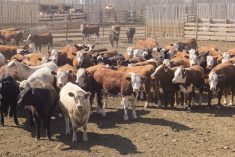Starting July 2, federally inspected meat plants in Canada will be required to label beef steaks or roasts that have been mechanically tenderized, the federal government announced Friday.
The move is part of new mandatory federal requirements designed to strengthen control over E. coli. Contaminated needles used to mechanically tenderize meat was identified as one of the factors contributing to the recent E. coli outbreak at Alberta processor XL Foods.
While these actions are specific to federally-registered plants, Health Canada also intends to propose broader mandatory labels to identify beef that has been mechanically tenderized at retail outlets like supermarkets. This voluntary practice has been in place since 2012, a federal release says.
Read Also

U.S. livestock: Feeder cattle hit contract highs on tight supply
Chicago | Reuters – All Chicago Mercantile Exchange feeder cattle futures and most live cattle futures hit contract highs on…
The government rolled out a new Safe Food for Canadians Action Plan May 17 that Prime Minister Stephen Harper says will strengthen food safety rules, make inspections more effective and improve consumer service and information.
“Canada has a world-class food safety system and our government is committed to taking real steps to make it even stronger,” said Agriculture Minister Gerry Ritz in a release.
Through the action plan, the Canadian Food Inspection Agency (CFIA) will launch a number of significant food safety enhancements over the next two years.
Most notably, the CFIA will work with consumer groups and industry to develop new regulations to bring into force the Safe Food for Canadians Act, passed in November 2012.
This spring, the CFIA will launch a two-year-long review of the food regulations in Canada which will need to be revised in order to bring the Safe Food for Canadians Act into force.
According to the Canadian Cattlemen’s Association, increased CFIA testing and oversight will be part of the plan, on top of new requirements to tighten controls at federally-registered plants that make beef trim, ground beef and beef patties.
The meat processing industry “supports the new measures for the control and monitoring of E. coli and for the labelling of mechanically tenderized beef cuts,” Canadian Meat Council executive director Jim Laws said in a separate release.
CCA president Martin Unrau said the new rules “will enhance industry efforts in the fight against E. coli.”
However, the CCA has also moved forward on its beef safety goal: to secure approval from Health Canada for irradiation of beef to control pathogenic E. coli.
The CCA said May 6 it had submitted paperwork to Health Canada to restart the process toward amending related regulations — a process which has sat dormant since Health Canada completed its scientific assessment of irradiation in 2003.
The approval process for irradiation is now expected to take at least another year, the CCA said.
“The CCA believes irradiation, when used with food safety interventions already in use, could essentially eliminate E. coli-related illness associated with ground beef,” Unrau said Friday.
Related story:
Cattlemen seek restart on approval process for irradiation, April 22, 2013
Independent panel named to review XL case, Feb. 8, 2013















